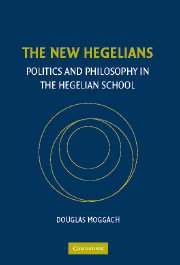Book contents
- Frontmatter
- Contents
- Acknowledgements
- Contributors
- Introduction: Hegelianism, Republicanism, and Modernity
- 1 Eduard Gans on Poverty and on the Constitutional Debate
- 2 Ludwig Feuerbach's Critique of Religion and the End of Moral Philosophy
- 3 The Symbolic Dimension and the Politics of Left Hegelianism
- 4 Exclusiveness and Political Universalism in Bruno Bauer
- 5 Republican Rigorism and Emancipation in Bruno Bauer
- 6 Edgar Bauer and the Origins of the Theory of Terrorism
- 7 Ein Menschenleben: Hegel and Stirner
- 8 ‘The State and I’: Max Stirner's Anarchism
- 9 Engels and the Invention of the Catastrophist Conception of the Industrial Revolution
- 10 The Basis of the State in the Marx of 1842
- 11 Marx and Feuerbachian Essence: Returning to the Question of ‘Human Essence’ in Historical Materialism
- 12 Freedom and the ‘Realm of Necessity’
- 13 Work, Language, and Community: A Response to Hegel's Critics
- Bibliography
- Index
3 - The Symbolic Dimension and the Politics of Left Hegelianism
Published online by Cambridge University Press: 22 August 2009
- Frontmatter
- Contents
- Acknowledgements
- Contributors
- Introduction: Hegelianism, Republicanism, and Modernity
- 1 Eduard Gans on Poverty and on the Constitutional Debate
- 2 Ludwig Feuerbach's Critique of Religion and the End of Moral Philosophy
- 3 The Symbolic Dimension and the Politics of Left Hegelianism
- 4 Exclusiveness and Political Universalism in Bruno Bauer
- 5 Republican Rigorism and Emancipation in Bruno Bauer
- 6 Edgar Bauer and the Origins of the Theory of Terrorism
- 7 Ein Menschenleben: Hegel and Stirner
- 8 ‘The State and I’: Max Stirner's Anarchism
- 9 Engels and the Invention of the Catastrophist Conception of the Industrial Revolution
- 10 The Basis of the State in the Marx of 1842
- 11 Marx and Feuerbachian Essence: Returning to the Question of ‘Human Essence’ in Historical Materialism
- 12 Freedom and the ‘Realm of Necessity’
- 13 Work, Language, and Community: A Response to Hegel's Critics
- Bibliography
- Index
Summary
One of the many divisions between Hegel and his Romantic contemporaries was over the status of the symbolic. For the Romantics, the symbol is the perfect fusion of form and content. As F. W. J. Schelling wrote, the symbol is the “synthesis” of the particular and the general, in “which the general does not signify the particular nor does the particular signify the general, but in which the two are absolutely one.” The symbolic expressed the Romantics' paradoxical quest for the unity of the perfectly individual with the fully universal, their contradictory yearning for both the fullest possible presence of meaning and the inexpressible, unapproachable, and inscrutable. The symbol, to cite Schelling once again, creates an “inner bond uniting art and religion,” and further, the symbol establishes the philosophy of art “as the necessary goal of the philosopher, who in art views the inner essence of his own discipline as if in a magic and symbolic mirror.” Hegel, by contrast, judged the symbol to be inadequate for philosophy, preferring the linguistic sign as the privileged medium of the science of the concept. According to him, a symbol conveys its meaning through the presentation of some quality or qualities that it has in common with that meaning. By contrast, the specific virtue of the sign is precisely its arbitrariness. Because its capacity to convey meaning depends only on convention and agreement, the sign could be purged of the naturalness and intuitiveness that linger in the symbol.
- Type
- Chapter
- Information
- The New HegeliansPolitics and Philosophy in the Hegelian School, pp. 67 - 90Publisher: Cambridge University PressPrint publication year: 2006
- 1
- Cited by



